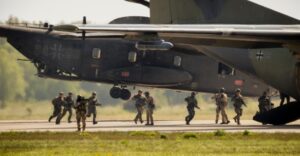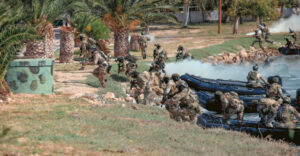NATO is preparing for the possibility of significant casualties in the event of a World War III scenario between Russia and the West, as the German military (Bundeswehr) estimates that such an invasion could occur within this decade.
NATO’s top logistics commander has emphasized that the alliance must be ready for mass casualties, according to international media reports.
German Lieutenant General Alexander Sollfrank, head of NATO logistics, confirmed this week that NATO is working to ensure it has the capacity to move large numbers of heavily wounded soldiers from the front lines, according to the British newspaper Daily Mail.
What the Plans Include
NATO’s plans for evacuating wounded soldiers from the front lines in case of a war with Russia may involve hospital trains, as air evacuations might not always be feasible, according to the senior general.
Additionally, the scenario for mass evacuations would be different from NATO’s past experiences in Afghanistan and Iraq, Lieutenant General Sollfrank explained to Reuters. In the event of a direct conflict with Russia, Western soldiers are likely to face a much larger war zone, with more casualties and a lack of air superiority near the front lines.
“The challenge for us will be to rapidly provide high-quality care for the worst-case scenario, where the West is facing a very large number of casualties,” Sollfrank said, without specifying the number of wounded NATO might need to treat.
The planning for medical evacuations has become a pressing concern for NATO, and according to the German general, it began after Putin’s war in Ukraine in 2022.
NATO’s Aim: Defense and Deterrence
One of NATO’s main goals is to strengthen its capacity to deter and defend against any potential Russian attack.
The German military believes that Russia could attack a NATO country by 2029, while Kremlin leader Vladimir Putin views the West as the aggressor, particularly as it supplies arms to Ukraine. It’s worth noting that Sollfrank leads NATO’s Joint Support and Enabling Command (JSEC), which coordinates the rapid movement of troops and tanks across Europe, as well as logistical preparations such as ammunition storage on NATO’s eastern flank.
A few months earlier, NATO’s Joint Support and Enabling Command (JSEC), based in Ulm, Germany, organized a coordination exercise.
Ask me anything
Explore related questions





